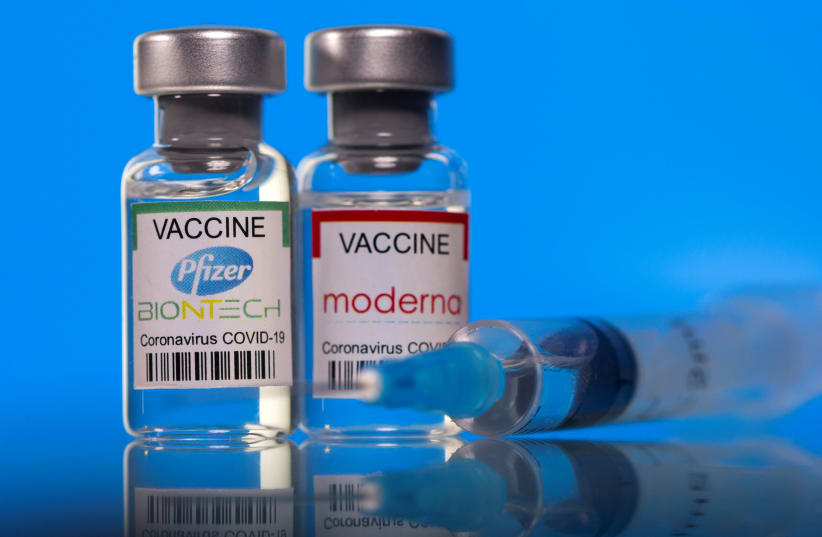The Pfizer coronavirus vaccine is somewhat less effective against the South African mutation; a new study has shown, raising a red flag among health professionals of the need to continue monitoring Israel’s airports to keep out what could be dangerous mutations.
The study, conducted by Clalit Health Services and Tel Aviv University, was the first of its kind based on real-world data. It has been published on the MedRxiv online site and therefore has not yet been peer-reviewed.
“The results indicate the need for genetic sequencing and constant monitoring for new variants, as well as continued implementation of non-pharmaceutical measures,” said Clalit’s Dr. Doron Netzer, head of Community Medicine at Clalit, who helped lead the study.
Lab studies have previously suggested that the South African variant could break through the protection provided by the Pfizer vaccine, but lab studies do not always hold up in real life.
The study counters a report released by Pfizer earlier this month that claimed the vaccine was 100% effective in preventing coronavirus among participants trialed in South Africa, where the mutation is prevalent.
In this case, what was shown in the lab turned out to also occur in real life, Prof. Adi Stern, of the Shmunis School of Biomedicine and Cancer Research at Tel Aviv University’s Faculty of Life Sciences, told The Jerusalem Post.
The study seems to counter a report released by Pfizer earlier this month that claimed the vaccine was 100% effective in preventing coronavirus among participants from a trial in South Africa, where the mutation is prevalent.
The report was released on Saturday night. This week, the Health Ministry plans to discuss allowing Israelis to go mask-free in open areas immediately after the Independence Day holiday that takes place on Thursday.
Last week, the government voted to change airport regulations and allow non-Israelis to visit their first-degree relatives in the country. Since March 20, all Israeli citizens have been able to enter from abroad.
Specifically, the researchers examined around 400 members of Clalit Health who tested positive for the virus 14 days or more after receiving the first dose of the vaccine in comparison to 400 unvaccinated people who caught corona, too. The cohorts were matched according to age, sector, gender and more.
The study showed that the South African variant is more likely to break through the vaccine’s protective effect, even after two doses have been administered and more than a week has passed.
All positive samples underwent genetic sequencing to determine with which variant each person was infected. Only 1% of the infected people had the South African variant. However, among individuals who had been infected after receiving two doses of the vaccine, the prevalence rate of those who had the South African variant was eight times higher than the rate in the unvaccinated matched individuals.
This means that the Pfizer vaccine does not provide the same level of protection against the South African variant. However, because so few Israelis have been infected with it, the researchers said they were unable to assess the exact reduction in effectiveness.
Stern suggested that the South African has less transmissibility than the original strain and certainly less than the British mutation – that has been shown to be as much as 70% more contagious than the original strain – and therefore has not managed to spread.
“It can break through the vaccine, but it cannot spread efficiently, so that is the good news,” Stern said, noting that one possible explanation is that the extensive spread of the British variant blocked the spread of the South African variant.
The results of the study drive home the message that Israel “has to be super careful about airports,” Stern cautioned. “We are in a unique position in Israel now. The vaccines are working, and amazingly, we are the only country in the world where life is going back to normal. The main threat now is what will happen through airport importations.”
Stern said that anyone who enters Israel should be tested and, if they are sick, the country should sequence their results to find out what variant they bear. They should also be effectively isolated.
“We don’t want to import masses of the South African variant and we don’t want to test how limited the transmissibility [of the variant] is in Israel,” Stern cautioned.
The study also examined the effectiveness of the Pfizer vaccine against the British variant and, once again, showed that the vaccine works. However, in 250 partially vaccinated individuals – meaning they had only had one dose of the vaccine or less than a week had passed since the second dose – the rate of the British variant was disproportionately higher compared to unvaccinated persons.
This means, Stern explained, that although some studies have shown a strong efficacy of the Pfizer vaccine even after the first dose, it takes two doses to combat the British variant most effectively. She said that this may explain why in December and January when so many Israelis started vaccinating it took longer than expected to bring down the country’s rate of infection.
“The findings signal that we cannot yet regard the pandemic as a thing of the past,” said Prof. Shay Ben-Shachar, head of Precision Medicine for Clalit Innovation. “It still remains important to continue social distancing and using masks.”
